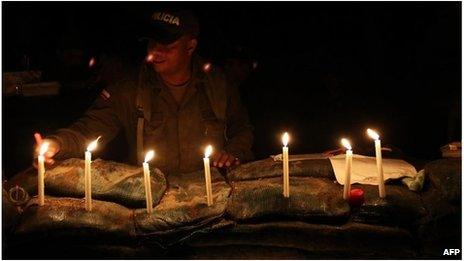Colombia's Farc announces unilateral ceasefire
- Published

Colombia's largest rebel group, the Farc, has announced a 30-day ceasefire starting on 15 December.
The announcement came a day after nine people were killed in a Farc car bomb attack on a police station.
The rebels declared a temporary ceasefire when they entered into peace talks with the government last year, but resumed fighting after two months.
The Colombian government has refused to enter into a truce until a final peace deal is signed.
'Dialogue and death'
In their statement on Sunday, the rebels criticised the government for its unwillingness to agree to a ceasefire.
"Soldiers and police are also unnecessarily spilling their blood, while the national opinion observes this strange cocktail of death and dialogue, which is how the national government perceives reconciliation," the statement signed by the Farc's high command said.
Five soldiers, a police officer and three civilians were killed on Saturday when Farc rebels exploded a car bomb outside a police station in the town of Inza, in south-western Cauca province.
President Juan Manuel Santos promised to redouble military efforts against the armed group.
"We will continue with our offensive, not give them a minute's rest, not a minute's truce, so they won't the ability to commit acts like the one we have unfortunately witnessed," he said
Despite the attack, negotiators from both the rebel and the government side continued with peace talks in Cuba on Sunday.
The government and the Farc have been in negotiations since November 2012 to end a 50-year war which has killed an estimated 220,000 people.
They have so far reached agreement on land reform and on a political future for the left-wing rebel group should a peace deal be reached.
The latest round of talks focuses on illicit drugs and drug trafficking.
- Published6 November 2013
- Published24 September 2015
- Published29 August 2013